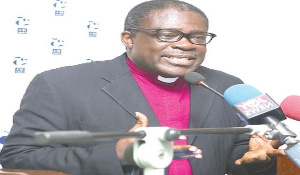- Home - News
- Polls
- Year In Review
- News Archive
- Crime & Punishment
- Politics
- Regional
- Editorial
- Health
- Ghanaians Abroad
- Tabloid
- Africa
- Religion
- Election 2020
- Coronavirus
- Photo Archives
- News Headlines
- Press Release
General News of Tuesday, 19 November 2019
Source: GNA
Ghanaians need consensus building on the Referendum- Rev Opuni-Frimpong
The Reverend Dr Kwabena Opuni-Frimpong, a lecturer at the Department of Religious Studies, Kwame Nkrumah University of Science and Technology, has called for a consensus building towards the upcoming referendum to reflect the view of all Ghanaians.
“If there is a window or an opportunity, then we must slow down the process and pursue consensus building” Rev Opuni-Frimpong, who is also the Chief Executive Officer of the Alliance for Christian Advocacy Africa, a not-for profit organisation, said in an interview with the Ghana News Agency on Monday.
He said the country needed to slow down the Referendum and allow more debate on the processes before the people were made to vote.
“What it means is that we can go ahead with the Unit elections and the other local assembly member elections on December 17 and slow the referendum, do national conversations and ask people to present papers and work towards a consensus.
The former General Secretary of the Christian Council of Ghana noted that the current state of affairs, where the referendum received political colours and each of the two leading political parties, the New Patriotic Party (NPP) and the National Democratic Congress (NDC) had taken a “yes” and “no” stand respectively, would not augur well for our democracy.
“The NDC is whipping its supporters to vote ‘No’ and the NPP is also whipping it members to vote ‘Yes’. What this means is that if any of their faithful members want to vote otherwise, then they might stay away from the Referendum on December 17.
“What the people need is to understand the whole process well for them to either decide to elect or vote for yes and no in support or against the election of Metropolitan, Municipal, and District Chief Executives (MMDCEs)on partisan basis.
“We must allow Ghanaians to vote in the referendum because of their convictions that if I go and vote yes, that is what is going to help local governance or if I vote no, that is my conviction and not what a political party said”.
“But what we must understand is that the effects of December 17 referendum will remain with us whether the NPP or NDC is in power, because it is a national Constitution issue that we are working on”.
He described it as sad that some institutions that were supposed to be unifiers and bring Ghanaians together were rather being divided by the referendum-“That is a threat to our national peace”.
Entertainment










